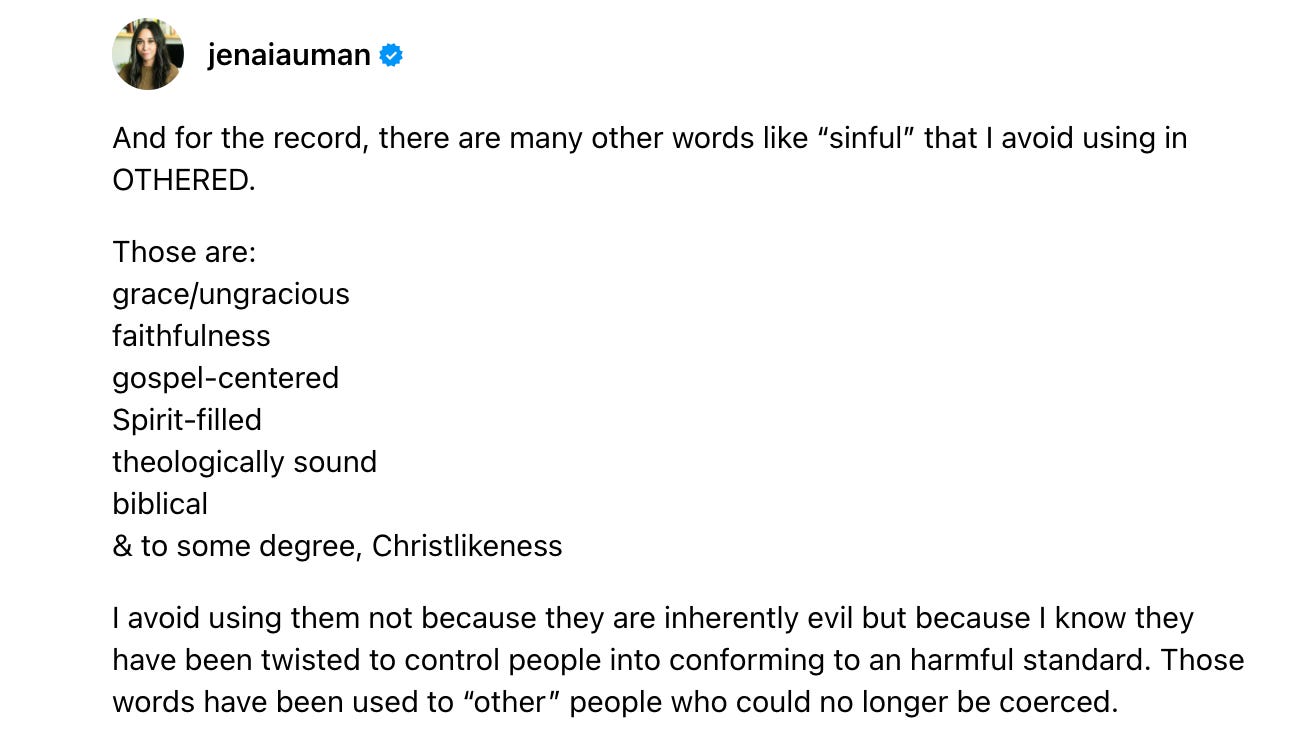Thought-Terminating Clichés in Christianity
+ all the other rejected book covers I drew for OTHERED
Photo by Jennifer Bonauer on Unsplash
I shared on both Threads and Instagram that I made an effort not to use certain words as I wrote my book Othered. Before I tell you what those words are, I want to talk about why I avoided including them. (To be fair, if you do read Othered, you will find some of these words in there, but I qualify and/or specify what I mean.)
I read Amanda Montell’s book Cultish two years ago. At that point, it had been a year since my family and I had left our former church. Before reading Cultish, I read many religious trauma and spiritual abuse books.1 These books were integral in helping me identify the culture my church was mired in, but Cultish introduced me to a phrase that, I think, is fairly critical to understand when holding effective conversations on the topic of religious abuse and trauma: thought-terminating cliché.
What is a Thought-Terminating Cliché?
Thought-terminating clichés quiet dissent and disempower dissenters. If you’ve previously been a dissenter in a groupthink organization, you may already sense what a thought-terminating cliché is. Montell says, “Cultish leaders often call on thought-terminating clichés, also known as semantic stop signs, to hastily dismiss dissent or rationalize flawed reasoning.” She goes on to say that thought-terminating phrases are a part of our every day language. Some examples she shares are “It is what it is,” “Boys will be boys,” “Everything happens for a reason,” “It’s all God’s plan,” and so on.2
People use thought-terminating clichés because, in using them, we feel as though we’re alleviating the tension that rises within us when we grapple with conflicting information. Montell adds, “These pithy mottos are effective because they alleviate cognitive dissonance, the uncomfortable discord one experiences when they hold two conflicting beliefs at the same time.”3 Thought-terminating clichés bypass the need to deal with the underlying issue by giving you permission to go on with life.
Because American Christian culture tends to be very trauma-uninformed or, worse, trauma-unaware, I think that many Christians have no idea what to do with their dysregulated nervous system. To be very reductive (and I know this is overly reductive), we experience nervous system dysregulation in conflict or when we sense we are being threatened. When we heal from past trauma, we begin to understand what we need to do to regulate our nerves. However, in a culture that tends to repress feelings, Christians often look for ways to bypass dysregulation so they can find homeostasis again—even if the familiar homeostasis they reach for is toxic.
(I shared a post on trauma-informed care a year ago. If you’re interested, you can find it linked below.)
Shutting Down Whistleblowers
People use thought-terminating clichés because it is easier to shut down the conversation than it is to deal with the problem dissenters point to. Montell mentions that “Digging for more information is poison to a power abuser; thought-terminating clichés squash independent thinking.”4 Because God and the Bible are ultimate authorities, Christians will reach for words found in Scripture to squash your grief and stymy your righteous rage so that they can quell their own anxiety and dis-ease. Christians who cling to toxic theology will teach that to love is to repress, and they’ll fault you for not repressing and falling in line with them.
They don’t want the cries of sheep. They want silent soldiers.
There are certain terms and phrases I avoid using (or used sparingly) when writing Othered because I wrote about finding a way forward after having to sit with the hard things. Having to hold conflicting beliefs. Many Christian words have become thought-terminating clichés as they have been consistently used AGAINST those who have blown the whistle on abuse in their churches. If you’ve tried bringing abusive behaviors to light in your church, some thought-terminating clichés you may have heard are:
“Saying this is really ungracious of you.”
“Our leader/pastor is so Christlike; what you’re saying sounds like gossip.”
“This is sinful language to utter about our shepherd.”
Thought-terminating clichés are semantic stop signs that inhibit conversations. They prevent you from telling the truth. They are subtle means people use to tell you what to think or what you should think. I need to repeat myself: These words are not inherently bad or evil in and of themselves, but they have been used in spiritually abusive ways to silence the suffering of God’s people.
To be totally fair, I think thought-terminating clichés exist in advocacy spaces too. The word “safe” can (and certainly already has) become a thought-terminating cliché, especially when narcissistic leaders learn the lingo of advocacy, try to gain clout in advocacy spaces, and attempt to use trauma-informed language in manipulative ways. (Thought-terminating clichés in advocacy is perhaps a post for another time.)
You can take a look at the Threads post where I speak to the words I avoided HERE.
Groupthink and the power dynamics of groupthink are why I tend to avoid phrases like “Spirit-filled,” “gospel-centered,” “theologically sound,” “biblical,” and, to some degree, “Christlikeness.” When people use “Christlike,” I think, “Yes, but how do I know that this isn't a toxic organization that has made Christ in its image?” When people use biblical, I ask, “Whose Bible, though, and how is it being interpreted?” “Gospel-centered,” but is it truly good news for everyone? It is hard to pushback on these words when they are governed by the rules of groupthink. To pushback would also seem to be pushing back on the god of the group, which is hardly ever the God of Scripture.
I avoid using certain words while writing Othered because I don’t want to inhibit conversations with people who are earnest in building bridges between divides. To be frank, I also do not engage in conversations or try to build bridges with people who use thought-terminating clichés against me; those are people who want me quiet so they can keep talking.
My life’s work is committed to helping heal what hurts in the world. I don’t use thought-terminating clichés because I don’t want to
my “side” to win a needless war. I want flourishing and goodness that God makes available to all. I want to be a part of bringing heaven on earth; thought-terminating clichés prevent that from happening.
With you and for you,
Want more book news?
I have a release date! June 25, 2024. You might have already caught the date if you’ve scanned my Instagram or Threads bio. I added the date there within the last few weeks. It is really nice to have to firm date, especially as I continue on in seminary and make plans for my spring 2024 semester.
For those wanting a peek at more book cover rejects 👀
Remember: The final chosen cover is NOT included here. These are the ones (minus one) that I sent to the art director a part of my publishing team. These were the covers that I thought were worth considering. In reality, I don’t like some of them. Drawing the cover of my book was and is a huge privilege, and I was incredibly grateful to be asked, but I was hard on myself, nearly ready to give up at the end of it all.
I featured the first (with a green background) in my last newsletter. I made an Instagram reel with a timelapse video of the second one with the sand dunes. I’ll upload more IG reels for the other covers I drew so you can see how those came together.
The one my publishing team and I ended up choosing was the one I drew the day before my concepts were due. 😬
I’ll reveal the final cover another time, though. 😉
A Word for PAID Substack Subscribers & Potential PAID Subscribers
I had lofty hopes that I would send more newsletters per month. My goal has always been to send one per month to everyone. I activated the paid Substack feature to 1) give people a chance to support my work and 2) to prep for upcoming book launch things.
For those who are current PAID subscribers, so long as you continue with your subscription, you’ll have access to all my book launch team things. Those who pre-order OTHERED in the future will be gifted a paid subscription to my Substack through book launch season. (I’ll announce more on this later.)
The PAID Substack posts and the Substack chat is how I plan to communicate with my “book launch team.” Other authors have hosted their book launch teams on Facebook, but I’m opting to use Substack instead. Facebook tends to become an incendiary place during a presidential election year (which is 2024 if you’re not keeping track).
Ideally, I would like to send one free plus one paid Substack post per month, but with seminary, book launch prep, and other things I’m pursuing behind the scenes (currently researching PhD programs on the downlow), I don’t have space to write anymore than I already am.
I LOVE Your Questions!
In my last Substack, I opened up the comment for anyone that had questions about my decision to apply and enroll in my seminary program.
I loved getting to interact with y’all in the post comments, so if you have questions (about ANYTHING), keep them coming.
Want to ask about my publishing experience? My writing process? How I plan my Substack posts? Seminary? How I’m approaching higher education? ASK here in comments!
If this post was helpful, considering tapping the heart 🖤 icon & leaving a comment. Your engagement helps me reach more people who may need a few words of hope. Encourage your friends to subscribe if you think the words here might be helpful for them.
You can find past posts from Othered by visiting jenaiauman.substack.com.
These books include David Johnson and Jeff VanVondren’s The Subtle Power of Spiritual Abuse, Dr. Chuck DeGroat’s When Narcissism Comes to Church, Dr. Diane Langberg’s Redeeming Power, Dr. Scot McKnight and Laura Barringer’s A Church Called Tov, and Dr. Wade Mullen’s Something’s Not Right. My reading has expanded beyond these books as I think reading books on abuse/power from only white voices is dangerously unbalanced, but these were integral in helping me identify what was going on in my church.
Amanda Montell, Cultish: The Language of Fanaticism, (New York: HarperCollins, 2021), 84–85.
Montell, Cultish, 85.
Montell, Cultish, 86.









I avoided using certain words in my book too, but mostly different ones than yours (biblical is on both our lists). It’s interesting how different subjects have different triggering words! I avoided sin for the most part. And few mentioned of pure or impure, God’s design, and the Bible is clear/says.
“Wisdom” was a big one for me. “I’m sure the pastors responded that way out of wisdom.”